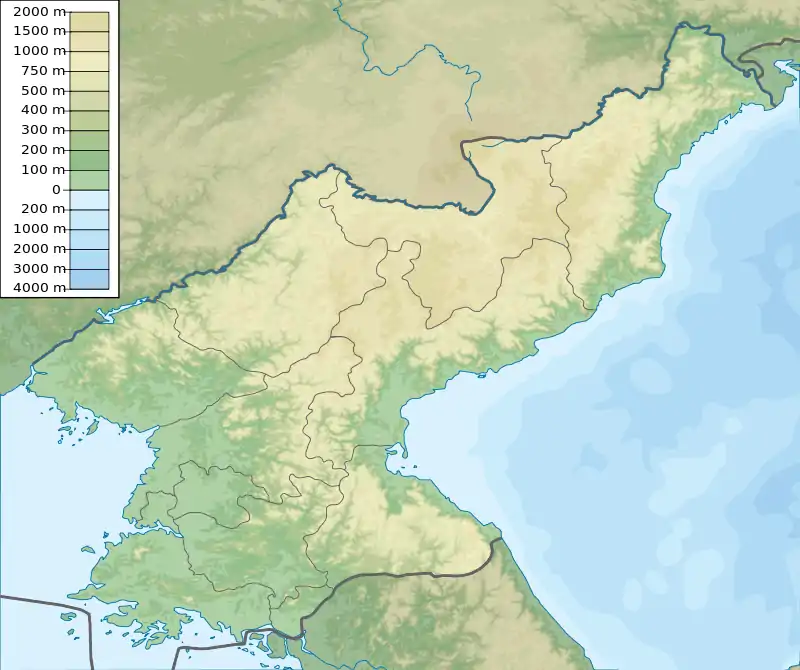| Sinuiju Formation | |
|---|---|
| Stratigraphic range: Barremian-Aptian ~ | |
| Type | Geological formation |
| Sub-units | 8 members |
| Overlies | Precambrian basement |
| Thickness | >500 metres (1,600 ft) |
| Lithology | |
| Primary | Sandstone, siltstone, mudstone |
| Other | Andesite |
| Location | |
| Coordinates | 40°06′N 124°24′E / 40.1°N 124.4°E |
| Approximate paleocoordinates | 43°48′N 125°48′E / 43.8°N 125.8°E |
| Country | |
| Type section | |
| Named for | Sinuiju city |
 Sinuiju Formation (North Korea) | |
The Sinuiju Formation(신의주층) is a geologic formation in North Korea. Formerly of uncertain age, it is now thought to be Early Cretaceous. A variety of fossils are known from the formation, including those of pterosaurs and birds, including an indeterminate anurognathid and a very large enantiornithine specimen with a 5 cm (2.0 in) long tibia and a 3.5 cm (1.4 in) long pygostyle. Frogs have also been found in the formation.[1][2] Numerous compression fossils of insects have also been found.[3]
Fossil content
Fish
Amphibians
- Anuran (a frog, might be referred to Liaobatrachus grabaui).[4]
Pterosaurs
- Anurognathidae indet.[1][2]
Birds
- Confuciusornithidae indet. (known colloquially as the Archaeopteryx of Korea)[1][2]
- Enantiornithes indet.[1][2]
- Ornithurae indet.[2]
Insects[5]
- Angarosphex baektoensus
- Sinuijuhelorus baektoensis
- Sinuijus baektoensis
- Stellularis sinuijuensis
- Stenophlebia ryonsangensis[6]
- Sinuijumantispa ryonsangiensis[7]
Other invertebrates
- Eosestheria (a conchostracan)[2]
See also
References
- 1 2 3 4 5 6 Gao, K.; Li, Q.; Wei, M.; Pak, H.; Pak, I. (2009). "Early Cretaceous birds and pterosaurs from the Sinuiju Series, and geographic extension of the Jehol Biota into the Korean Peninsula" (PDF). Journal of the Paleontological Society of Korea. 25 (1): 57–61. ISSN 1225-0929.
- 1 2 3 4 5 6 7 8 Choi, S.; Lee, Y.N. (2017). "A review of vertebrate body fossils from the Korean Peninsula and perspectives". Geosciences Journal. 21 (6): 867–889. Bibcode:2017GescJ..21..867C. doi:10.1007/s12303-017-0040-6. S2CID 133835817.
- ↑ Jon, SuHyang; Won, CholGuk; So, KwangSik; Nam, TuYong (July 2019). "New Mesozoic insect fossils from the Democratic People's Republic of Korea". Cretaceous Research. 99: 240–245. Bibcode:2019CrRes..99..240J. doi:10.1016/j.cretres.2019.02.019. S2CID 134337948.
- ↑ So, Kwang-Sik; Jong, Tal-Mi; Won, Chol Guk; Jo, Song-Dae (2022-08-05). "A fossil anuran from the Lower Cretaceous Sinuiju Formation, North Phyongan Province, Democratic People's Republic of Korea". Cretaceous Research. 140: 105304. Bibcode:2022CrRes.14005304S. doi:10.1016/j.cretres.2022.105304. ISSN 0195-6671. S2CID 251425462.
- ↑ Paektodong, Sinuiju City at Fossilworks.org
- ↑ Won et al., 2021
- ↑ So, Kwang- Sik; Won, Chol-Guk (2022-02-16). "A new fossil mantis fly (Insecta: Neuroptera: Mantispidae) from the Lower Cretaceous of the Democratic People's Republic of Korea". Cretaceous Research. 135: 105175. Bibcode:2022CrRes.13505175S. doi:10.1016/j.cretres.2022.105175. ISSN 0195-6671. S2CID 246936524.
Bibliography
- Won, C.G.; K.S. So, and H.C. Kim. 2021. A new odonatan (Stenophlebiidae) from the Lower Cretaceous Sinuiju Formation of North Phyongan Province, the Democratic People’s Republic of Korea. Palaeoworld in press. .. . doi:10.1016/j.palwor.2021.02.002
This article is issued from Wikipedia. The text is licensed under Creative Commons - Attribution - Sharealike. Additional terms may apply for the media files.